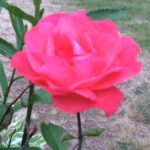My favorite philosopher, Robert Spaemann, would have become a gardener had Hitler won the war. Hitler not having won the war, Spaemann became a philosopher. Praise be to God. I, on the other hand, have become a gardener. Praise be to—well, I am not actually sure whom to praise for this extremely peculiar development. Let there be praise, though. The great Wittgenstein knew the importance of gardening, and I should try to see its value for philosophy.
There is much weeding to be done in the garden that is mine to keep. And it is mine to keep, for a little while, anyhow, until my Brothers call in competent gardeners to repair the damage and restore order. However, even for those unprepared and scornful of competent help, gardening in the midst of overwhelming weeds is an experience to behold. Especially so for priests ordained for service in Holy Mother Church. Tolkien knew why only Samwise, the gardener, would stay with Frodo, serving him the way he needed to be served, with uncompromised dedication.
 What does it mean to be a priest? My Franciscan Brother, Joseph Glaab the Younger, was ordained to the priesthood, to the sacred order of presbyters, just a couple of weeks ago. He joined the fraternity to which I, too, have belonged for now three years, and he was the first whose head I was to hold in prayer so that it would be formed anew for the life he was about to begin.
What does it mean to be a priest? My Franciscan Brother, Joseph Glaab the Younger, was ordained to the priesthood, to the sacred order of presbyters, just a couple of weeks ago. He joined the fraternity to which I, too, have belonged for now three years, and he was the first whose head I was to hold in prayer so that it would be formed anew for the life he was about to begin.
Returning to gardening after the ceremony had been concluded gave me opportunity to reflect on what it means to be a priest. Probably, as I had already realized during the ordination, it is not to give advice. I had given a little bit of advice to my soon-to-be-brother-priest. Such as, practice the putting on of the priestly vestments, for it is tricky, especially when wearing a headset microphone and doing this in the midst of a complex liturgy. He had not heeded my advice. I hope he remembers the other advice that I gave him, but it does not seem likely.
Probably, the giving of advice is overrated, especially when it prevents the having of valuable experiences. In any event, there are plenty of professional counselors from which to receive advice on all that might trouble the living. Notwithstanding the importance of their work , I felt that this is not what the priesthood is about.
The priest’s role is different, and we ought to be mistaken for gardeners, rather than counselors. At the same time, we are not really gardeners, either, as our proper domain is rather more permanent than life as we know it. Our proper domain is blessings. Our proper domain is benedictions, the acknowledgement of goodness so that this goodness enters into eternity rather than remaining merely potential in the passing of the present. The pulling out of weeds that is my preoccupation in my garden right now is not at all a good way of looking at my priestly duties. However, the experience allows me to see what my priestly duties are about. In between the weeds, I look for plants to keep, the ones that are supposed to be there. And as I clean up my garden, I try to see them and figure out what the garden would have been like had I taken better care of it. What priests must do is see the potential among what is real, or the little plants that might grow into something bigger, something beautiful and worth keeping for all eternity. When we see them, we are to call on God’s blessing for them so that the world is restored and its goodness is preserved. We are to bless what must be preserved so that it will become nothing less but the Body of Christ.
 During a gardening break while writing this, I found this most beautiful rose blooming in the midst of my weeds. It is my only one. Once, there had been many rosebushes in this flower bed, and I can still see the remnants of them. A previous gardener, long ago, must have decided to replace them with something else, and he only left their roots behind, and a few dying branches that I was about to cut off. But then I found this one rose, down below at the tip of a new shoot, perfect in its beauty. Praise be to God.
During a gardening break while writing this, I found this most beautiful rose blooming in the midst of my weeds. It is my only one. Once, there had been many rosebushes in this flower bed, and I can still see the remnants of them. A previous gardener, long ago, must have decided to replace them with something else, and he only left their roots behind, and a few dying branches that I was about to cut off. But then I found this one rose, down below at the tip of a new shoot, perfect in its beauty. Praise be to God.

